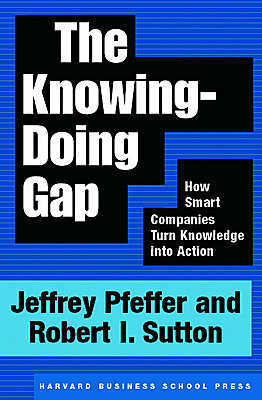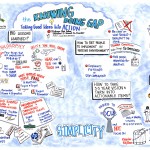Podcast: Play in new window | Download (Duration: 11:03 — 10.5MB)
Would you rather listen than read? Just click play at the bottom of the page, or you can download the audio to your smartphone or computer if you’d like. This audio is 11:03 minutes long.
On Becoming A (Better) Learning Executive
 In late 1999 a couple of my favorite “academic” authors – Jeffrey Pfeffer and Robert I. Sutton – (both guys are professors at Stanford) published a book entitled, The Knowing-Doing Gap: How Smart Companies Turn Knowledge into Action. The title became a big part of my management philosophy because it resonated with a message I had been preaching since the 1980’s, “How good could we be if we just did the things we know are right?” My teams had heard that kind of evangelism for a long time. I just wasn’t smart enough to distill it like these brainiacs from Stanford.
In late 1999 a couple of my favorite “academic” authors – Jeffrey Pfeffer and Robert I. Sutton – (both guys are professors at Stanford) published a book entitled, The Knowing-Doing Gap: How Smart Companies Turn Knowledge into Action. The title became a big part of my management philosophy because it resonated with a message I had been preaching since the 1980’s, “How good could we be if we just did the things we know are right?” My teams had heard that kind of evangelism for a long time. I just wasn’t smart enough to distill it like these brainiacs from Stanford.
You can read the book if you’ve not done so yet. Or, you can just look at this fully illustrated infographic that sums up the book. Just click on the illustration.
What matters is what happens every day!
The pace of change in today’s is without prior precedent. The sheer volume of information is staggering. According to a Tech Crunch post dated August 4, 2010, Eric Schmidt, the CEO of Google, declared an amazing “fact.” Every 2 days we now create as much information as we did from the dawn of civilization up until 2003. That’s something like 5 exabytes of data, according to Schmidt. He’s smarter than me because I don’t even know what an exabyte is!
I’ll bet you didn’t know that statistic, but I know you’re feeling it. Data overload. Info gorging. Call it whatever you want, but all of us experience what many liken to “drinking from a fire hose.” We’re sometimes just overwhelmed with all the stuff coming at us and the stuff we have to keep up with. And manage.
At this rate, it’s not surprising that the things we knew yesterday – you remember those things – the things that once worked, but stopped working leave us puzzled thinking, “What happened?” Of course, the Internet changed everything. So if you’re a leader who can’t remember the pre-Internet world then you’re struggling to keep up like the rest of us, but you may not have quite the same fight to learn some new tricks. You just have to concentrate on learning newer tricks. Those of us who remember the pre-Internet world (and we remember when we thought faxing was cool technology), well, our row to hoe is tougher.
Most of the executives I serve are extremely bright, capable and adaptive people. Even smart folks get stuck every now and again. What’s most perplexing to me is a person’s willingness to surrender or to give up on learning because the pace seems daunting. That’s why I like to start with Pfeffer and Sutton’s book. You can’t give up on learning.
Let’s Start With Doing The Things We Already Know (A Simple, But Maybe Not-So-Easy Exercise)
For the moment, don’t focus on learning something you don’t yet know. Focus on what you already know you should be doing, but for whatever reason you’re not doing it. That’s why I included that “Knowing-Doing” section of the deeper dive assessment.
First, think about yourself. Consider your own work and your own leadership.
Use the form below to complete the exercise.
Make a list of 3 things that fit the bill. List three things (big or small, it doesn’t matter) that you know with certainty are things you should be doing, but you’re failing to do them. These might be things you do sometimes, but not as regularly as you should. They might be things you completely neglect. Excuses or reasons why you’re failing aren’t important. Nobody cares about excuses. You need to stop caring about them, too.
These should be things that require no learning curve. You already know these things and you already know the first step required to take action in each of them. Write down these 3 things. Comment as much, or as little, as you’d like about each one. We’ll discuss these privately.
Next, think about your people – your team. Don’t get bogged down considering what they’re failing to do that you “think” they know. Focus on the things you’re certain they know to do. Hint: You’ll know they can do these things because they’ve successfully done them before. You’ve seen it…so there’s no doubt they can. These will likely be different for each of your direct reports since they’ve all got different roles and responsibilities.
Write down their names and then under their names list 3 things they know to do, but are failing to do. Again, these can be large or small. Just make certain these aren’t things you think they know. They must be things you’re certain they know. No, we don’t care about their excuses or reasons either. And don’t get sidetracked with those because they don’t matter.